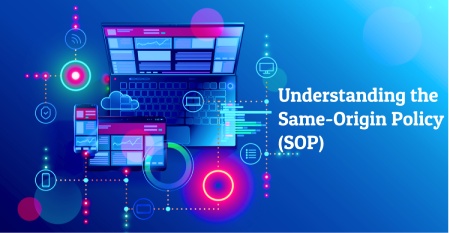Master AI & Build your First Coding Portfolio with SkillReactor | Sign Up Now
Understanding the Same-Origin Policy (SOP)

The Same-Origin Policy(SOP) is a fundamental security concept deeply ingrained in web browsers. It defines a set of restrictions that dictate how documents or scripts from one origin can interact with resources from another origin. In this context, an origin comprises the scheme (protocol), host (domain), and URL port. This policy plays a pivotal role in maintaining the integrity and security of web data.
The Role of SOP in Web Security
The primary function of the SOP is to prevent malicious scripts on a website from accessing sensitive data on another website. Let’s explore this in detail:
Preventing Data Theft and Tampering
SOP restricts access to a web page's Document Object Model (DOM) and other critical resources from scripts running on different origins. This prevents malicious scripts from reading or modifying sensitive information, which could otherwise lead to data breaches.
Mitigating Cross-Site Scripting (XSS) Attacks
XSS attacks involve injecting malicious scripts into web pages viewed by others. SOP helps mitigate such attacks by ensuring that scripts from one origin cannot access data or script execution contexts of another origin.
Guarding Against Cross-Site Request Forgery (CSRF)
CSRF attacks trick a user's browser into executing actions on a different website where they are authenticated. SOP helps prevent these attacks by ensuring that scripts can only send requests to their originating servers by default.
Isolating Potentially Malicious Documents
By enforcing origin isolation, SOP ensures that potentially harmful documents or scripts loaded from one origin cannot interact with resources from another origin, thereby containing any malicious activity.
Building User Trust
By safeguarding against common web-based attacks, SOP plays a critical role in building and maintaining user trust in web applications and the internet ecosystem.
Examples of SOP in Action
Imagine you are logged into your email account in one browser tab. Without SOP, a script from a different website, open in another tab, could potentially read your emails or act on your behalf, posing significant security risks. SOP safeguards against such threats by restricting scripts to operate only within their originating domain.
Limitations of SOP
Despite its importance in security, SOP also has notable limitations:
- Restrictive for Modern Web Applications: In today's interconnected digital environment, many legitimate use cases require interaction across different origins. SOP, by default, blocks such interactions, which can hinder the functionality of web applications.
- Complex Workarounds Required: To facilitate legitimate cross-origin interactions, developers often need to implement complex workarounds like Cross-Origin Resource Sharing (CORS) or JSONP, which can add to the development overhead.
- Reliance on Browser Implementation: The effectiveness of SOP depends on its implementation in browsers. Any inconsistency or flaw in this implementation might create security loopholes.
- Performance Overheads: Implementing SOP checks and managing cross-origin communication (like using CORS) can introduce additional processing and network overhead, potentially impacting the performance of web applications.
- Not a Standalone Solution: SOP is not a silver bullet for web security. It needs to be complemented with other security measures, as attackers continuously find innovative ways to bypass such restrictions.
The Same-Origin Policy (SOP) is a fundamental security mechanism implemented in web browsers to control how documents or scripts loaded from one origin can interact with resources from another origin. It's crucial for maintaining the security and privacy of web users.
Let's break down its components and implications:
Workarounds and Extensions
While SOP adds security, sometimes legitimate web applications need to interact across different origins.
Various techniques and technologies allow for controlled exceptions:
- CORS (Cross-Origin Resource Sharing): A standard that allows servers to declare who can access their assets.
- JSONP (JSON with Padding): A method for server-side code to provide JSON data to scripts from different origins.
- PostMessage: A mechanism that enables safe and controlled communication between windows from different origins.
Understanding the Same-Origin Policy is important for recognizing why CORS (Cross-Origin Resource Sharing) was developed. CORS serves as a solution to the limitations of SOP, allowing for controlled and secure cross-origin requests, which are essential for the functionality of modern, interconnected web applications.